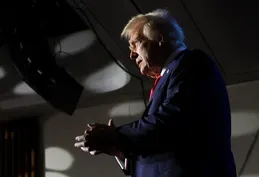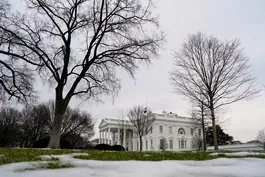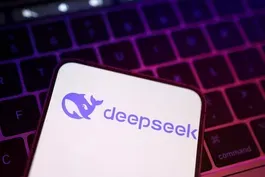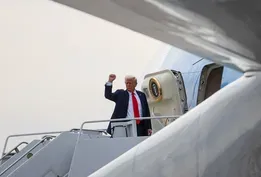
Chinese AI startup DeepSeek shakes up the industry
Clip: 1/27/2025 | 5m 50sVideo has Closed Captions
Chinese AI startup DeepSeek shakes up industry and disrupts financial markets
A China-based artificial intelligence startup is shaking up the industry. It’s called DeepSeek and its biggest advantage, analysts say, is that it can operate at a lower cost than American AI models like ChatGPT. It's disrupting markets and raising national security questions about China's progress to develop advanced AI. Geoff Bennett discussed more with Gerrit De Vynck of The Washington Post.
Major corporate funding for the PBS News Hour is provided by BDO, BNSF, Consumer Cellular, American Cruise Lines, and Raymond James. Funding for the PBS NewsHour Weekend is provided by...

Chinese AI startup DeepSeek shakes up the industry
Clip: 1/27/2025 | 5m 50sVideo has Closed Captions
A China-based artificial intelligence startup is shaking up the industry. It’s called DeepSeek and its biggest advantage, analysts say, is that it can operate at a lower cost than American AI models like ChatGPT. It's disrupting markets and raising national security questions about China's progress to develop advanced AI. Geoff Bennett discussed more with Gerrit De Vynck of The Washington Post.
How to Watch PBS News Hour
PBS News Hour is available to stream on pbs.org and the free PBS App, available on iPhone, Apple TV, Android TV, Android smartphones, Amazon Fire TV, Amazon Fire Tablet, Roku, Samsung Smart TV, and Vizio.
Providing Support for PBS.org
Learn Moreabout PBS online sponsorshipGEOFF BENNETT: A new China-based artificial intelligence start-up is shaking up an industry known for its rapid innovation.
It's called DeepSeek, and its biggest advantage, analysts say, is that it can operate at a lower cost than American A.I.
models like ChatGPT.
It's already the top download in the Apple Store, sudden popularity that's disrupting markets, especially the tech-focused Nasdaq, and it's raising lots of national security questions about China's progress amid a global race to develop artificial intelligence.
Gerrit De Vynck is a tech reporter for The Washington Post and joins us now.
Thanks for being here.
GERRIT DE VYNCK, Tech Reporter, The Washington Post: Of course.
GEOFF BENNETT: So, explain for the unfamiliar, what is DeepSeek, this new Chinese-based A.I.
start-up that's the source of such consternation in Silicon Valley?
GERRIT DE VYNCK: Yes, so I mean, people are maybe familiar with OpenAI or the maker of ChatGPT.
Maybe they have used other A.I.
tools from other big tech or American companies to help them write a resume or help them write a wedding speech or maybe even help them with e-mails at work, generate images, that kind of thing.
DeepSeek is just a small Chinese company that essentially makes a product very similar to ChatGPT.
It's a chatbot that you can have a conversation with.
You can ask it to generate all kinds of writing.
You can sort of do research on it.
And the big reason why people are so freaked out about it here in Silicon Valley and I think in political and national security circles as well is that people have seen A.I.
as something that's very expensive to do.
You need to put a lot of money into it, tens and even hundreds of millions of dollars, in order to train A.I.
software to be as capable as the leading A.I.
programs like ChatGPT.
And according to these Chinese researchers who work at DeepSeek, they have actually found ways to do it much more efficiently, meaning they can produce very highly capable A.I.
software at a fraction of the cost of what American companies have been spending.
GEOFF BENNETT: Right.
DeepSeek says it took them only two months and less than $6 million to create this model it uses, which raises the question.
Washington banned the export.
Of advanced technology to China, so that it couldn't have an upper hand in the U.S.-China battle for tech supremacy.
How did China make an end run around that?
GERRIT DE VYNCK: Yes, I mean, the way that you make something like ChatGPT is, you take a huge amount of data and you run it through a bunch of really, really advanced computer chips, most of which are made by U.S. company Nvidia.
And those computer chips are very expensive, and over the last couple of years everyone's been scrambling for them.
And with the goal of sort of slowing down the Chinese A.I.
industry, the Biden administration actually put very strict controls on exporting those chips to China.
However, there has been quite a bit of reporting and the Biden administration before it left office actually admitted that Chinese companies were still able to find ways to get chips either by buying them through third countries or smuggling them in.
GEOFF BENNETT: And, as we mentioned this app, this DeepSeek app surged to the top of the iPhone download charts shortly after it was released.
And I imagine that also raises national security concerns, given all the hand-wringing about TikTok, and now there's this other Chinese app.
GERRIT DE VYNCK: Yes, I think it's quite interesting.
I mean, regular people can download this app, they can use it.
And there's all sorts of concerns, if you're putting your data into DeepSeek, it's going to go to a Chinese company.
I think people should really think twice about maybe using this app, of course, remembering, if you use an American app, they're also logging your data, but maybe you're more comfortable using an American company than a Chinese one.
But what's I think even more interesting is that DeepSeek has actually made their technology available on the Internet for anyone to download.
And so, yes, there is an app, there's a Web site that you can use DeepSeek just like you might use ChatGPT.
But if you have a business and you want to use A.I.
technology to make your own business or your own app more capable, you can just use DeepSeek's technology and sort of configure it and see how it works for yourself.
And so there's concerns that, if you use DeepSeek, maybe it's censored, it's not going to be giving you answers about Tiananmen Square or other sort of controversial aspects from a Chinese perspective.
But if you just download their software, you can use it yourself and it's not censored at all.
GEOFF BENNETT: There's some reports today that the panic over this has been overblown, at least to the degree that it's been reflected in the markets.
What do you make of that?
And what are the overall implications for the global A.I.
marketplace?
GERRIT DE VYNCK: You mentioned that sort of $6 million number.
And I want to contrast that number with the number we got last week, which was which was $500 billion, which is the goal that OpenAI has in terms of investing in building out new A.I.
data centers and buying computer chips, right?
And this was an announcement they made alongside President Trump on his first real day in office, very -- he was very excited.
He was very keen to sort of showcase that this money was going to be spent here in America.
And suddenly we now are asking questions such as, do you really need that amount of money to build advanced A.I.?
And so that's really the question that the tech industry is reeling with here.
And I think there's different opinions.
Some people say, well, actually, it's not that bad.
Even if you find more efficient ways of making A.I.
software, having a lot of computer chips, having a lot of money will still give you an advantage in the long run because you can do even more with it.
But that's really the question that we're going to sort of see answered over the next few weeks and months here.
GEOFF BENNETT: Gerrit De Vynck of The Washington Post, thanks for being with us.
GERRIT DE VYNCK: Any time.
200,000 displaced Palestinians walk home to northern Gaza
Video has Closed Captions
200,000 displaced Palestinians walk home to northern Gaza after 15 months of war (1m 47s)
Colombia spat may be sign of Trump's Latin America strategy
Video has Closed Captions
Public spat with Colombia could be sign of Trump's Latin America strategy (4m 55s)
Fear spreads in immigrant communities as raids escalate
Video has Closed Captions
Fear spreads in immigrant communities as raids and deportations escalate (6m 46s)
Firing of government watchdogs raises fraud concerns
Video has Closed Captions
Trump's firing of independent watchdogs raises concerns about government fraud and ethics (6m 27s)
Museum preserves shoes of youngest Auschwitz victims
Video has Closed Captions
Museum works to preserve shoes belonging to Auschwitz's youngest victims (7m 48s)
News Wrap: Trump signs executive orders focused on military
Video has Closed Captions
News Wrap: Trump signs executive orders focused on military (5m 31s)
Tamara Keith and Amy Walter on Trump's rapid policy rollout
Video has Closed Captions
Tamara Keith and Amy Walter on Trump's rapid policy rollout and reaction to his first week (7m 19s)
Trump gathers with GOP lawmakers to map out his agenda
Video has Closed Captions
Trump gathers with GOP lawmakers to determine tactics to move his agenda forward (5m 4s)
Providing Support for PBS.org
Learn Moreabout PBS online sponsorshipMajor corporate funding for the PBS News Hour is provided by BDO, BNSF, Consumer Cellular, American Cruise Lines, and Raymond James. Funding for the PBS NewsHour Weekend is provided by...




















